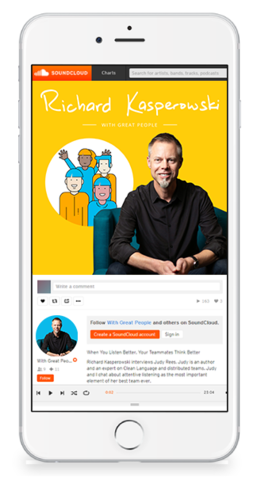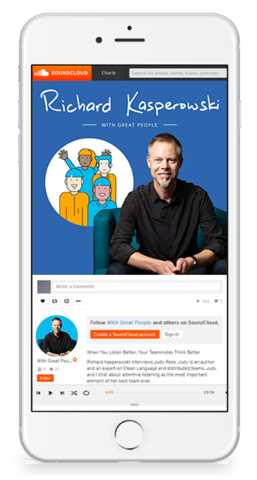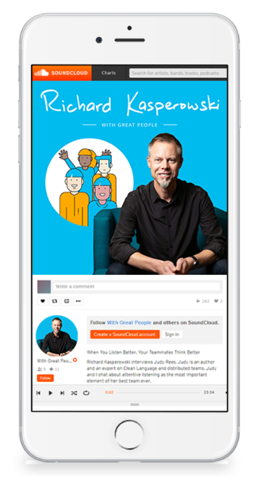Categories
There’s No One Truth for How to Do Things
Yuval Yeret: There’s No One Truth for How to Do Things
with Yuval Yeret
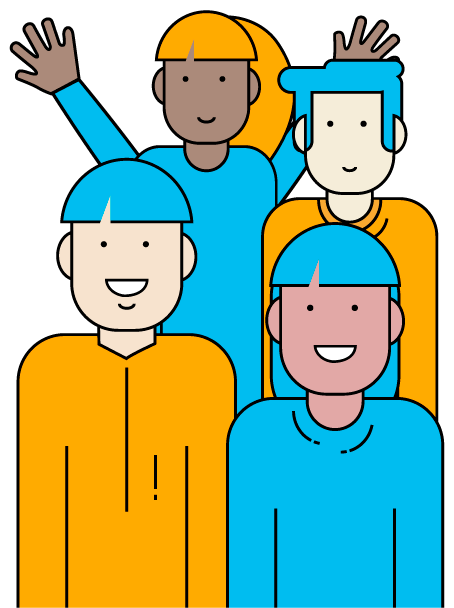
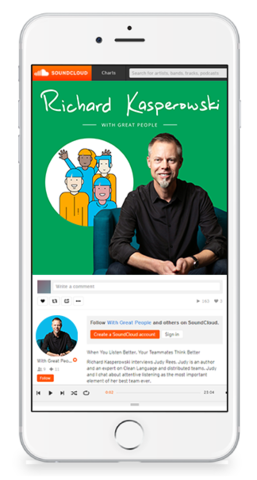
TRANSCRIPT
Richard Kasperowski: 00:10 Hi friends! Welcome back to With Great People, the podcast for high performance teams. I’m Richard Kasperowski. This episode is a conversation with Yuval Yeret. Yuval is an Agile coach and trainer at Agile Sparks. Yuval and I chat about his best team ever, which he describes as family. He offers advice to listeners working with both face-to-face and partially distributed teams. And he recommends letting team members manage themselves as much as possible. To support this podcast sign up for my newsletter at kasperowski.com. Thanks for listening.
Richard: 00:49 Welcome to the show Yuval.
Yuval Yeret: 00:51 Hey, hello Richard thanks for inviting me.
Richard: 00:54 You’re welcome thanks for stopping by the secret underground studio. It’s really nice to have you here. Will you introduce yourself to our listeners?
Yuval: 01:01 Sure. I’ve been an Agile coach and trainer since 2009, basically trying to help teams become great. Since that point trying to replace some of the benefits that I’ve seen, some of the great work that I’ve seen with teams that I was part of back in 2006 during Agile and before that. I’ve been in the IT and software development industry since, oh my god, 1993. Quite a lot of years by now.
Richard: 01:40 Alright, so back in 2006 was that when you got involved with this Agile stuff, or what was that?
Yuval: 01:48 Yeah, so I was leading R&D in a small storage unit working start-up in Israel. And one of the team leads basically came and said: “Listen, there’s some stuff that isn’t working, I really want to do some of those things.” And he came in with actually some of the practices from extreme programming initially. We actually started doing continuous integration first before all of the rest from that [inaudible 00:02:19] Scrum and then Kanban and the rest is kind of history.
Richard: 02:22 Alright, cool. So this is the podcast about high-performance teams. And I’ve got a question that I ask every one of our guests. So the question is this; What is the best team that you were ever on in your life? And when you take yourself back to that team, how did it feel? So, first what is the best team you were ever on in your life? Tell us about that.
Yuval: 02:46 So, it’s actually a tough question because it’s like asking you who’s your favorite kid. I mean I can talk about a couple that weren’t great, but I have a couple of examples of very different teams that I thought were great experiences for me. One was, actually the first team I was part of back in the Israeli Air Force we were a networking and security team, that was one example. Another example, the most recent team is my team at Agile Sparks, the team of Agile coaches. Let’s chose the Agile Sparks team just because it’s fresher.
Yuval: 03:28 I think what made it best- that was the question right? [crosstalk 00:03:34]
Richard: 03:34 Yeah, so this is your best team, your current team, is Agile Sparks?
Yuval: 03:41 It’s my current team, I currently have some struggles with defining it as my best team because two and a half years ago I moved over from Israel to the U.S. So I lost some of the, we talk about collocated teams, and just being there and being able to go out with the team members and have fun with them is something that is harder to do, when I am in Boston. But, when I was in Israel, in the first couple of years for the company it was great because we shared a purpose, we shared the feeling that we were doing something great. We were helping other people become great, we were bringing the spark to organizations. And, despite the fact that as Agile Coaches we weren’t working together day-to-day. We actually worked together virtually, at the meta-level. We were consulting with each other, we were getting together every week to spend a couple of hours to talk about challenges and to talk about things, we were innovating with things, we were supporting each other. It was a feeling of something that was very different than working within organizations.
Yuval: 05:04 I think that one of the differences for me at least was that I spent many of the years before that, or several of the years before that as VP R&D in a couple of development organizations. That’s a very lonely role sometimes. You’re very different than the rest of the management team of the organization and you can have a great R&D team, or [inaudible 00:05:34] engineering team, but you’re still alone in some levels, in some of the considerations and in Agile Sparks in my team I found a couple of people like me that tell me we had people to work with. Okay, so that I think is part of what made that team great from my perspective at least.
Richard: 05:55 So this current team, your Agile Sparks team, I don’t know if you ever really paused to kinda even meditate on the team. This is when I’d like to invite guests to do this. So let’s try it right now.
Richard: 06:11 Just like empty your mind, blank things out, put your hands at your sides. Maybe close your eyes. You trust me, right?
Yuval: 06:23 Even in the secret dungeon [crosstalk 00:06:24].
Richard: 06:25 Even down here in the little dungeon.
Richard: 06:28 Relax your belly. I don’t know if you have a meditation practice. [crosstalk 00:06:32]
Yuval: 06:31 No.
Richard: 06:32 These are some of the things I do when I meditate.
Yuval: 06:33 No, I’m not into meditation.
Richard: 06:37 Really? I don’t know, try to experience the essence of your Agile Sparks team. Can you distill it down to one word? What is the one word that would describe the experience of being part of this team?
Yuval: 06:56 To me it was like a family.
Richard: 06:58 Family? Yeah. So what else about family? How was it like family?
Yuval: 07:04 We were very close to each other, at least some of the years; in the first couple of years. Then there were the high points of a family celebrating things together and really enjoying when anybody in the family is succeeding with something and not really competing too strongly with each other, on the other end there were some competitions- friendly competitions like within a family. There were some struggles like in any family. There were the parents and the kids and sometimes the kids want to have their freedom, and sometimes are not yet ready for that freedom. So there are a lot of comparisons to a family. At first thought, it’s awesome to have a family, but in any situation, there are also challenges which is what makes it interesting.
Richard: 08:09 So, family… [crosstalk 00:08:11]
Yuval: 08:10 It’s a family I won’t replace, right? I don’t want to replace.
Richard: 08:14 Family you don’t want to replace, you’re celebrating everything with each other, any time anybody has some achievement to celebrate.
Yuval: 08:21 And a lot of [inaudible 00:08:22] of being together since 2009, 2010, it’s a very long time. [crosstalk 00:08:29]
Richard: 08:29 It’s been a long time, is this like a fresh start-up, you just met each other, or a lot change companies every three years even.
Yuval: 08:38 There’s a core team, and there are some people that have looked for different things… like in a family sometimes the kids go to college, or go to somewhere else and some others join. But, the core team has been there for a long time.
Richard: 08:58 So, family and how do you… Agile Sparks is your current team, it’s a current live company, how do you know that it’s a great team? How do you know that you’re a high performing group? Do you have anything objective that you can [crosstalk 00:09:16] [inaudible 00:09:16] here. Do you have full objective experiences?
Yuval: 09:21 Yeah, so first of all, a lot of the fact that a lot of us are staying with the team is a good indication that we’re happy at what we’re doing and we’re happy about the team. I tell people all the time if you want to measure what’s going on one of the best measures is the measure of people’s happiness. So that’s one measure. The other measure is, it’s working, right? The companies succeeding, the customers are happy, it feels like we’re providing value and bringing the spark to different places.
Richard: 09:58 I love that phrase, “bringing the spark.”
Yuval: 10:05 Beyond that, those are the measures that we have. We’ve been trying to look at more objective measures of how people feel about things, and we’re doing some surveys from time to time and looking at things.
Richard: 10:26 But it’s really these two things that have been together for a long time? And happiness?
Yuval: 10:34 Mm-hmm (affirmative), to me those are the important indicators.
Richard: 10:38 Alright, what are some concrete behaviors, what are some things that you do together as a team that sort of induces that success?
Yuval: 10:50 I think, and especially after moving here to the U.S and seeing how other some other consulting teams or companies work, the fact that we insist on getting together very frequently [crosstalk 00:11:07] and face-to-face [crosstalk 00:11:08] face-to-face collocated in the same room, despite the fact that we’re working with clients the rest of the week. [crosstalk 00:11:14] [inaudible 00:11:15] in a bigger room then the dungeon, yes. But it’s not that big. We get together and we hash out things we do our own community of practitioners and we work on business challenges and on strategy and the whole team gets involved so that’s something concrete that we do. It’s obviously a challenge for me to do it right now since I’m in the U.S. and they’re in Israel. It breaks a bit of that spirit for me, and for them.
Richard: 11:49 So how do you cope with being remote from the rest?
Yuval: 11:52 Well, I try to be there once a year. For ongoing meetings, it is a challenge. It is a challenge, and I’d even say that I’m a much different member of that team today than I’ve been when I was back in Israel. I’d say I’m more of a secondary circle around that team. And I think that’s fine, that’s a natural thing that happens. You know I try to be there on [inaudible 00:12:23] when we’re having the meetings, we have our own slack team and we try to do some things there which obviously is a good thing but also a challenge. There are things that you want to say on slack that is not necessarily the best medium to have some sort of conversations at a team level. So we need to be careful about what we do there and what we do face-to-face. We have our WhatsApp group we steal, share things from our lives in our WhatsApp groups.
Richard: 13:05 As if you were family. [crosstalk 00:13:07]
Yuval: 13:07 Just as if we were family, yeah. Somebody has been on a desert vacation, they share some picture somebody has taken, run a marathon, or something they share pictures and the others celebrate with them and encourage them.
Richard: 13:23 Alright, so you’re doing physical meet-ups at least once a year with you and more often with the rest of the [crosstalk 00:13:30] crew.
Yuval: 13:30 The rest of the crew every two weeks.
Richard: 13:32 Every two weeks?
Yuval: 13:33 Yeah, every two weeks, gets together for a half a day. Yeah.
Richard: 13:35 Every two weeks, half a day. That is a big investment for a consulting company.
Yuval: 13:42 It’s a challenge for us, right. It’s not trivial to do that. But we found that it’s really important. I mean it’s a challenge also to figure out what’s the right agenda for such a meeting and whether to just do it cause [inaudible 00:13:58] practitioners, helping each other or do we try to advance company roadmap stuff, develop things… what’s the right way to do that? Is it to gather as a whole team, or break out into smaller teams, do things of [inaudible 00:14:15]. A lot of challenges I know are shared with many other consulting teams that have a day job of working with the clients.
Richard: 14:26 Yeah, your billable days, and this half day is not billable, it’s [inaudible 00:14:31] working on yourselves, working on your business, working on your company, your skills. How do you decide what to do during those half days?
Yuval: 14:44 Typically the team decides. So our current process is that every time we have such a meeting coming up, and it’s always coming up, every person on the team can suggest a topic; “I need 50 minutes.” Or; “I want 50 minutes to discuss this.” Or, “I want 30 minutes to discuss that situation with a client.” Or some new thing they’re working on and it’s up to the team to basically vote and figure out what’s the agenda for those meetings, and if there isn’t any agenda. Now sometimes what we do is we do a no agenda meeting. Basically, just get together, and we find things to talk about. There doesn’t have to be an agenda or we do a lead coffee or something. And sometimes no agenda, we’re all busy, we skip this step.
Richard: 15:43 Once in a while, yeah?
Yuval: 15:44 Yeah once in a while it’s okay to skip.
Richard: 15:47 The rest of the group in Israel meeting twice a week for half a day…
Yuval: 15:51 Twice a month.
Richard: 15:51 Twice a month for half a day? Yeah, every two weeks for half a day. Little different from twice a week. How do you participate in that here, halfway around the world?
Yuval: 16:04 Yeah, that’s a real challenge. We’re still trying to figure out a way to do that. Sometimes I just connect, via Zoom. Sometimes I don’t. Sometimes I connect for parts of the meeting.
Richard: 16:20 Even the time zone is a challenge.
Yuval: 16:22 Yeah, it’s like seven hours time difference. [crosstalk 00:16:26] So a lot of the time I actually prefer to do it when I wake up, then deal with it somehow in the morning. A lot of times I do it on Sunday because they prefer to do it on Sunday because it’s time that they can take off their client work. So that’s even more of a challenge for me. I mean on paper you could work it out, but it is Sunday. With the kids and everything, it’s not the right mood to be in a team meeting. That’s something we’re still trying to figure out.
Richard: 17:07 You got these regular meetings, are there any other concrete behaviors, concrete practices that you engage in that lead to your success?
Yuval: 17:14 We do have a shared way of working, what we call the Agile Sparks way, that we developed a couple of years ago. That kind of guides us, how we engage customers, what we do and it’s not that everybody follows it to the letter, it’s more a shared language that we have to talk about things and to use as a baseline when we discuss a customer or do something. It’s the Agile Sparks way. We are doing it or we are doing some exception of it, but we have something shared that we could use as a baseline or anchor for the discussion.
Richard: 17:53 So you got the Agile Sparks way.
Yuval: 17:55 Yeah, the way of doing things. Other concrete behaviors… I mean we do have, as part of that way we have shared materials that we are developing and that people follow and for some of the critical moments in engagements that we have we actually got together even together with an organizational consultant and developed a consultancy approach to how to do those things. Every year we have a theme of let’s focus on that area and develop it together. These are part of the things that we do when we finally get together face-to-face. When I visit Israel that’s part of the stuff that we do together, take that opportunity to-
Richard: 18:55 Alright, now take this back to our listeners now. How could our listeners get some of this goodness for their team? What advice do you have for listeners?
Yuval: 19:08 I’m trying to figure out whether it’s a unique situation that we have, because of everything and what of it we can we [inaudible 00:19:23] out and offer people to try and do. For sure, doing a community of practice sort of meaning with everybody on the team where its a democratic meeting, where the team owns it and figures out what to do. It’s definitely a recommendation. I would say let the team own as much as the team’s agenda, would be very important that we talk about autonomy. I would say it should be very clear what’s the purpose, what are we trying to do together here.
Yuval: 20:06 There should be a shared purpose or shared mission across the team. I would say try to find a team that you could see yourself feeling like family with. Whether you’re looking at your own team, try to work on that whether you’re considering whether to join a team or whether you’re happy with a team. Try to think about; “Can this team be a family for me? Do I want this team to be a family for me?” And if not maybe that should be part of your considerations when you’re deciding where to work.
Richard: 20:46 Yeah I love this advice, think about it like, “Do I want to be a part of this family?”
Yuval: 20:56 From what I’ve seen so far it’s pretty different than a lot of the teams that I’ve seen here but I’ve seen teams that work this way. I’ve seen some examples of teams that work this way.
Richard: 21:06 Yeah, beautiful. Is there anything else you’d like to add?
Yuval: 21:11 Let me think. So, I’m an Agile coach and trainer and most of the days what I am trying to bring to teams is ways to spark the change, to help them be greater than they currently are. I think one of the lessons both from Agile Sparks as well as from what I’ve seen with clients is that there’s no one truth for how to do things. People like to see us Agile practitioners as zealots and preaches and we come with our Scrum or with our Kanban or with our SAFe that they like to look for the methodology for how to do things and I think the lesson both from looking at our team and teams that we work with is that there’s no such thing. It’s always a combination of things there’s no one method that is the best for any team, and even if it’s best one way is right for you right now it will not necessarily be the right way to do things a year forward.
Yuval: 22:41 Maybe when a team member moves to Boston or when you are ten people instead of seven people or your 15 people instead of ten people. So I invite people to be curious and to try to learn about different approaches and to compare them and to take the best and experiment with something from this one, something from that one. I’m personally trying to embody that approach in what I do. I’m that person that is both SAFe trainer and I can help people figure out if SAFe is good for them and help them do SAFe. I’m also a professional Scrum trainer and I can help them do Scrum and that’s part of being with Scrum I am also investing a lot of my energy on people not just fighting about is Kanban better or is Scrum better, actually combine them. Why not use the best of both? I think this world of hybrids or mash-ups, whatever you want to call them, that’s our future in the Agile community, not just one Agile methodology or framework that will rule them all. So that would be my main advice to people.
Yuval: 24:09 Keep careers, keep looking at different things, try them see what works.
Richard: 24:14 Alright, thanks Yuval. Now if listeners want to contact you is there a way for them to do that?
Yuval: 24:18 Sure. I’m blogging a lot at agilesparks.com/blog at scrum.org/blog. I’m available on LinkedIn if they look up Yuval Yeret I’m sure they will not find too many other people there. So it’s very easy to reach me. I’m Yuval Yeret on Twitter. You can find me all over the place I guess.
Richard: 24:43 Alright, Yuval Yeret. Thank you very much for being our guest today. It was a pleasure having you down here. Thanks
Yuval: 24:48 Sure. Thanks for inviting me.
Richard: 24:51 Hi friends, thanks for listening. And remember to support this podcast sign up for my newsletter at kasperowski.com.



